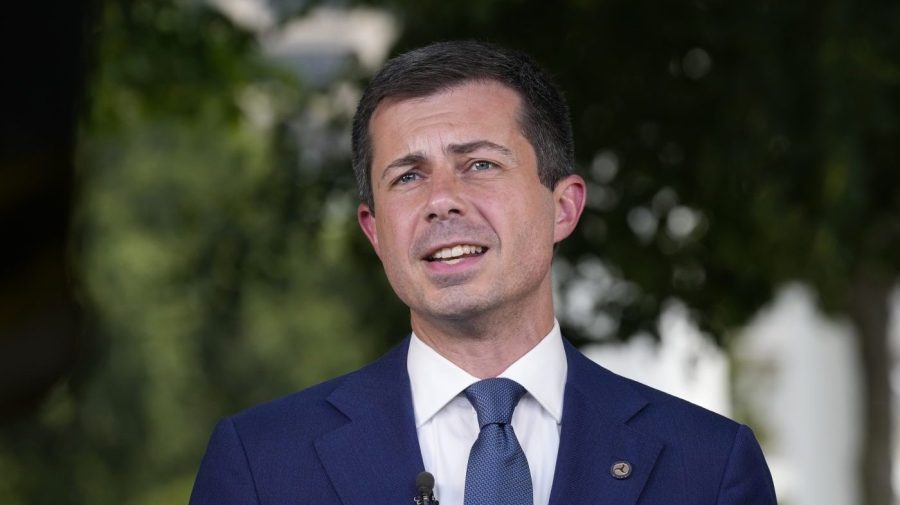
Former Transportation Secretary Pete Buttigieg is considering a run for Michigan’s Senate seat, the latest development to roil what is quickly shaping up to be one of next year’s most competitive and closely watched races.
Buttigieg moved to the Great Lakes State with his Michigan-native husband in 2022, triggering questions about his political future after eventually leaving his post in the Biden administration’s Transportation Department. Last week’s announcement from Sen. Gary Peters (D-Mich.) that he wouldn’t seek another term in 2026 appears to have opened a clear path for Buttigieg.
While he would likely face opposition and wouldn’t automatically coast to the nomination, Democrats said they’re excited by the prospect of Buttigieg jumping in and suggested he would be an early favorite as one of the best surrogates for the party.
“I’m excited,” said former Rep. Mark Schauer (D-Mich.) about the prospect of Buttigieg entering the race. “I think he is a rare political talent, which he’s demonstrated as the Transportation secretary and on the campaign trail.”
Buttigieg has experienced one of the most rapid rises of any Democrat of the past five years, going from mayor of South Bend, Ind., to becoming one of the most prominent voices in the party.
He turned in an unexpectedly impressive performance in the 2020 Democratic presidential primaries, winning the Iowa caucuses and nearly winning in New Hampshire. Though he dropped out in March, he endorsed then-candidate Joe Biden and became a key supporter, eventually joining Biden’s administration.
Political observers have expected Buttigieg to seek elected office again, and he has been rumored as a possible 2028 presidential candidate. Early polling has often placed him as one of the top potential choices for Democrats.
But a Senate run in 2026 may be the launching pad for a long political career regardless of any larger future ambitions.
“If it’s your end-state goal to become president, this gets you to D.C. in one of the very top elected jobs in the country,” said Michigan Democratic strategist Adrian Hemond.
Buttigieg had already been speculated to be planning a run for statewide office in Michigan since moving to Traverse City a few years ago, but much of that had focused on a possible gubernatorial run, with Gov. Gretchen Whitmer (D) reaching her term limit in 2026.
But that quickly shifted, as did the calculus for several other possible candidates, after Peters decided not to seek a third term. Buttigieg and several others almost immediately expressed interest in the seat, and The Detroit News reported on Saturday that he had officially ruled out running for governor and is “very seriously focused” on a possible Senate run.
Former Michigan Sen. Debbie Stabenow (D) told the outlet she expects “a lot of people will encourage” Buttigieg to run.
Analysts said a Senate run makes more sense for Buttigieg and may be an easier lift than a gubernatorial run given his relative newness to the state.
Pollster Steve Mitchell, the CEO of Mitchell Research & Communications, said the firm conducted polling last year on the gubernatorial race and found in September that Buttigieg had a “huge lead” over other possible candidates. With Peters not running, a Senate bid would be easier to pull off for someone relatively new to the state, he said.
“It seems to me, given the fact that he came to Michigan two years ago, is not originally from here, running for the Senate is a lot better position than running for governor,” Mitchell said, adding that running for governor requires a deeper understanding of the state government.
Candidates seeking office in a state they’re relatively new to have often faced accusations of “carpetbagging,” but Mitchell said history shows many more instances of those candidates pulling off successful Senate runs than gubernatorial bids.
He pointed to Robert F. Kennedy’s (D) successful bid for Senate in New York in 1964 despite his background in Massachusetts, and former Sen. Hillary Clinton’s (D) victory in New York in 2000 despite being from Arkansas.
Schauer, who was the Democratic nominee for governor in 2014, said he’s not too worried about Buttigieg’s recent move being an issue for him as a candidate. He noted that Buttigieg’s husband, Chasten, is a Michigander and that South Bend is “a stone’s throw” away from Michigan, only a few miles away from the border.
He also noted that Republicans could face their own attacks on this issue if the 2024 GOP Senate nominee, former Rep. Mike Rogers (R-Mich.), is nominated again. While Rogers represented Michigan in the House for more than a decade, he moved to Florida before moving back to Michigan shortly before mounting his run.
Rogers, who came within 20,000 votes of Sen. Elissa Slotkin (D-Mich.) in the race, is considering another run.
Matthew Morey, the communications chair for the Kent County Democratic Party in Michigan, said Buttigieg also has “deep” ties to the Midwest and has showed his “commitment” to that region of the country. And he argued that Buttigieg can have crossover appeal.
“While he absolutely appeals to a huge swath of the Democratic base, he also has demonstrated that he can work with anybody who is wanting to make a little bit of progress,” Morey said.
Buttigieg has blazed a bit of his own path in the media, often seeking out appearances on major conservative media channels and other seemingly hostile outlets.
The Democrat appeared regularly on Fox News’s daytime newscasts during the 2024 campaign and sparred with Fox anchor Shannon Bream on the network’s public affairs show last summer over issues like immigration and crime.
“There are a lot of Americans who my party can’t blame if they are ignoring our message because they will never hear it if we don’t go on and talk about it,” Buttigieg said while defending his decision to appear on Fox in 2019.
Still, Democrats said the field is open and they expect a competitive and lively primary. While a few other candidates have ruled out bids, others such as state Senate Majority Whip Mallory McMorrow (D) and Reps. Haley Stevens (D) and Hillary Scholten (D) are among the top names being floated, each certainly prominent within Michigan.
“I don’t think that Buttigieg clears the field at all, but he’s certainly a very, very strong candidate, and if he gets into this race, I expect he will raise money very, very quickly,” Hemond said.
Morey said Buttigieg would represent a “new generation of leadership” that would energize Democrats in Michigan, but the party boasts a deep bench of qualified candidates.
“We always love a crowded primary,” he said. “It gives us the opportunity to show the full range of what it means to be a Democrat. … so having all of these different voices and perspectives in the primary really gets to showcase that.”











